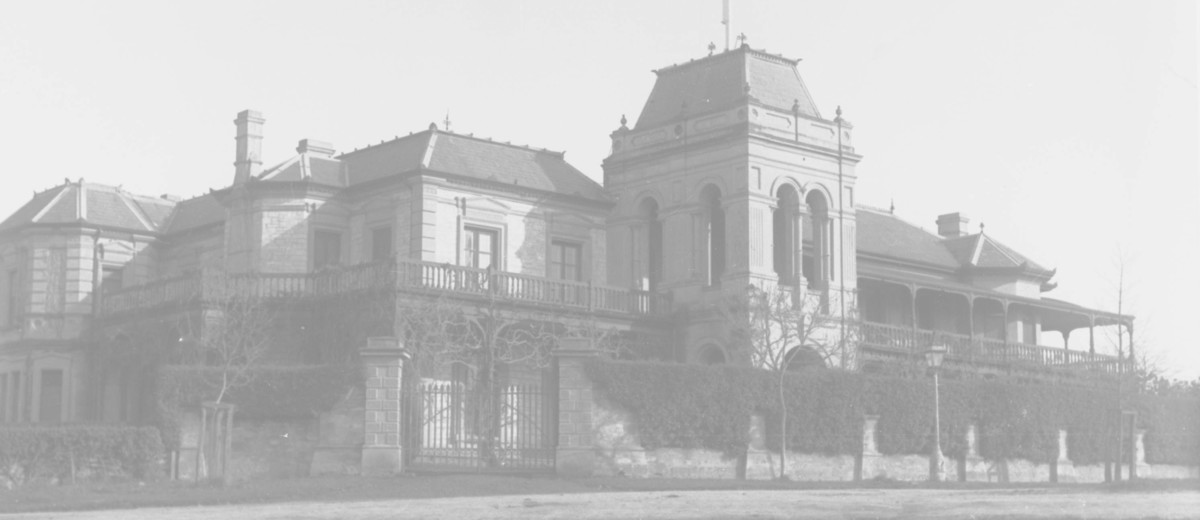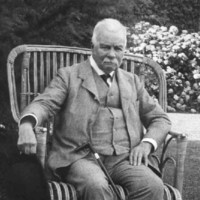Person
ContributeWhen Robert Barr Smith died in 1915 at the age of 91, long obituaries extolled his role as an astute merchant, noted economist, leading pastoralist and an outstanding philanthropist. A journalist commented, ‘There is hardly a religious, educational, philanthropic, or charitable institution to which he has not been a munificent donor.’
Born in Lochwinnoch, Scotland, on 4th February 1824, he was the son of Presbyterian Free Kirk minister, Reverend Dr. Robert Smith and his wife Marjorie (née Barr). Having studied commerce at Glasgow University, he set up business there as a commission agent and cornfactor. He emigrated to Melbourne in 1854 and the following year came to Adelaide to join Elder & Co., a firm established by the four sons of a prosperous ship owner, Capt. George Elder of Kirkaldy, Scotland. Robert Barr Smith was courting their sister Joanna but by the time she arrived to marry him in 1856 all except Thomas Elder had left the colony. The firm was restructured several times and in 1863 took the now famous name of Elder Smith & Co., with Thomas Elder (the visionary) and Robert Barr Smith (the business genius) as partners.
From a firmly established mercantile and shipping base the company expanded into pastoral and mining exploration. The risks taken in 1860-61 in undertaking a liability of £80,000 to develop the Wallaroo and Moonta copper mines brought the partners enormous wealth. They opened up vast tracts of agricultural land and set up a trading network of stock and station agencies supplying goods and services to developing communities, implements and equipment for pastoralists and miners, wool stores, shipping facilities and, when needed, financial assistance.
A lifetime love affair between Robert and Joanna produced thirteen children, six of whom died in infancy. They travelled extensively on company business and lived in rented houses before buying the magnificent Torrens Park Estate (now Scotch College) at Mitcham in 1874 where they entertained on a grand scale. Another mansion, ‘Auchendarroch’ at Mount Barker, was their summer home.
Robert Barr Smith was acknowledged as one of Australia’s most distinguished citizens and a brilliant economist, yet he steadfastly refused to enter Parliament or local government. He was a director of several successful financial institutions including banks and insurance companies, was on the Board of Governors of the Botanic Garden, the Council of the University of Adelaide and the Public Libraries Board, and was Consul for Sweden and Norway. He was an ardent supporter of free trade and helped to finance the Overland Telegraph Line.
He was exceedingly modest, shunned publicity and preferred to dispense his generosity anonymously if possible. He funded the beautiful spires of St. Peter’s Cathedral, stained-glass windows in churches at Mitcham, Walkerville and Mount Barker, the completion of the Australian Inland Mission at Oodnadatta, and convents for the Sisters of St. Joseph. The University received many donations, there was radium for William Bragg, money to establish an observatory on Mt. Kosciusko, art lessons for Hans Heysen, paintings for the Art Gallery, a fountain for the Botanic Garden, a steam lifeboat, a new wing for the Queen Victoria Maternity Hospital and a crematorium for West Terrace Cemetery. He also paid off the debt on the Trades Hall, equipped troops with horses during the Boer War and supplied two ambulances for the front during World War I.
Shortly before he died on 20th November 1915, Robert Barr Smith offered Torrens Park for use as a military hospital, fully furnished and equipped at his expense. Yet he refused a knighthood saying, ‘I have done nothing to earn it, and the acceptance of it would be inconsistent with the spirit of my whole life.’ He was buried, with his wife Joanna, in the Mitcham Anglican Cemetery.
Media
Add mediaImages

History SA. South Australian Government Photographic Collection, GN07770

Image courtesy of the Barr Smith family. Not to be reproduced without permission

Image courtesy of the State Library of South Australia, SLSA: B 7749, Public Domain

Image courtesy of the State Library of South Australia, SLSA: PRG 280/1/13/153, Public Domain


CommentAdd new comment
Quickly, it's still quiet here; be the first to have your say!